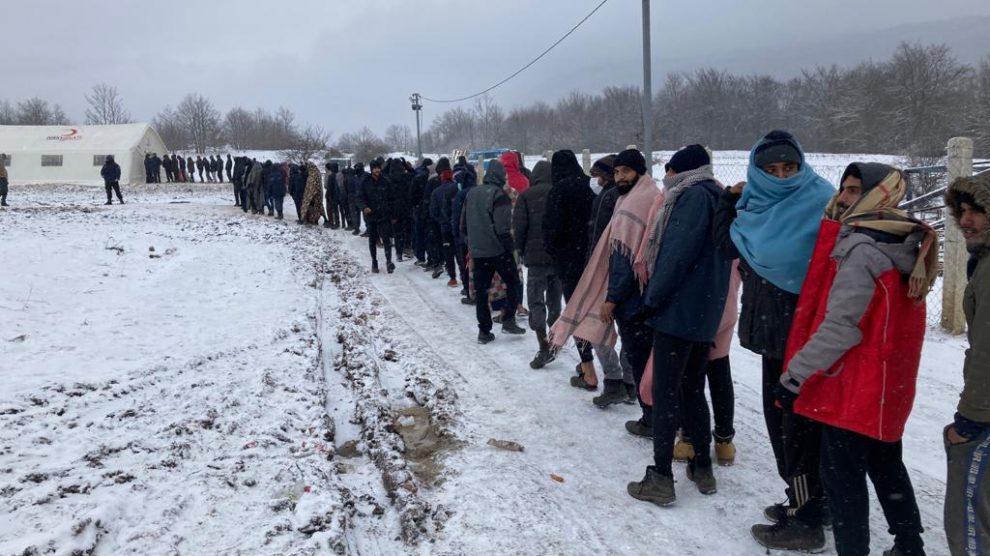A lack of long-term solutions and safe routes to Europe has once again created a humanitarian crisis on the EU’s borders.
A number of leading human rights organisations, including Amnesty International, Jesuit Refugee Service Europe, Médecins du Monde Belgique and Refugee Rights Europe, have called for immediate humanitarian support to address the current migrant emergency in Bosnia and Herzegovina as well as durable institutional solutions to meet the needs of people transiting through the country.
Approximately 2,500 people, including 900 residents of temporary camp Lipa, remain without basic shelter in perilously cold conditions in Bosnia and Herzegovina as authorities fail to provide adequate accommodation to migrants and asylum-seekers, and EU agencies continue to support short-term solutions.
- Enough of double standards in Bosnia and Herzegovina
- Bulgaria could be an attractive destination for refugees from the Middle East
- Migration and the platform economy
“Accommodation is available to house most of the people currently sleeping rough in bitterly cold temperatures in Bosnia and Herzegovina. What is lacking is the political will to make that happen. The authorities at all levels must immediately provide suitable shelter and assistance to those in need,” says Eve Geddie, director of Amnesty International’s European Institutions Office.
No long-term solutions despite EU assistance
The European Union has provided over 88 million euros in assistance to Bosnia and Herzegovina to strengthen its migration management capacity over the past three years. Despite this, the country has failed to identify suitable facilities for the accommodation of migrants and asylum-seekers, assume full responsibility for the management of existing facilities or to provide minimal guaranteed support to those stranded in the country.
“The EU now has to work with the authorities in Bosnia and Herzegovina on finding systemic, long term solutions to meet the needs of people on its territory and ensure that this situation does not reoccur yet again next winter,” said Eve Geddie.
“The EU’s responsibility is clear – the current humanitarian crisis is also a consequence of EU’s policy of fortifying its borders that has left thousands of people stranded on its periphery or in the neighbouring countries.”
Lipa unsafe, as temperature plummets
Many of those at risk were housed in a temporary makeshift camp in Lipa, northwest Bosnia, which was shut down on December 23. A fire broke out during the closure, converting the area into an uninhabitable wasteland. The authorities have since installed dozens of heated tents on the ground, but close to 400 people remain in makeshift shelters despite heavy snow and temperatures that are forecast to plummet in the coming days.
“Without access to running water, adequate sanitation or heating, and significant risks to people’s health and safety, Lipa remains unsuitable as a permanent accommodation site,” says Geddie.
“Many people, including families with children, continue to seek refuge in parks, houses, defunct factories, and forests close to the border with Croatia. They are in desperate need of shelter and humanitarian assistance as they face dire winter conditions.
“Ultimately, EU’s support for humanitarian crises will ring hollow unless it changes the policies that cause them. The EU must create more genuine opportunities for safe and legal ways for those fleeing conflict, persecution or poverty to reach Europe.”
A predictable crisis
The current humanitarian crisis was predictable – and entirely avoidable. As with every year, the arrival of colder weather provoked stark warnings by humanitarian and human rights organisations that without urgent, additional and suitable facilities, people would face the prospect of spending the winter months without an adequate shelter.
There are around 8,500 migrants and asylum-seekers currently in Bosnia and Herzegovina, with some 6,000 are accommodated in the UN-operated reception centres. While additional equipped facilities with significant bed capacity set up with financial assistance from
the EU are available, such as the Bira reception centre in Bihac, local authorities have prevented their use.
There are similar facilities in other parts of the country, but the Bosnia and Herzegovina Council of Ministers and local governments have not been able to agree to their use, making the relocation of people currently sleeping rough impossible.
Bosnia’s complex constitutional structure often obfuscates actual lines of responsibility, and political will to coordinate response to crises or manage issues of shared responsibility is essential.
Indeed, for years, the Una-Sana canton on Bosnia and Herzegovina’s border with Croatia has been coping with the majority of people stranded on the country’s territory alone, which has resulted in a backlash and measures that have prevented further arrivals in the canton.
Photo: EU Civil Protection and Humanitarian Aid
Unlike many news and information platforms, Emerging Europe is free to read, and always will be. There is no paywall here. We are independent, not affiliated with nor representing any political party or business organisation. We want the very best for emerging Europe, nothing more, nothing less. Your support will help us continue to spread the word about this amazing region.
You can contribute here. Thank you.







[…] Bosnia and Herzegovina’s entirely predictable refugee crisis […]